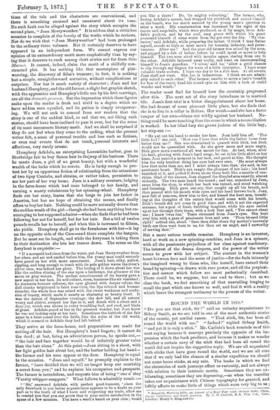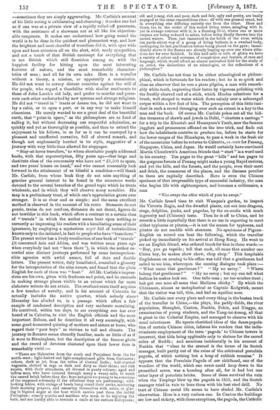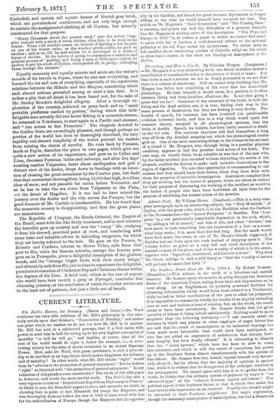ROUND THE WORLD IN 1870.*
"Do you see that stick, Sir ?" said an unlucky acquaintance to Sidney Smith, as we are told in one of the most authentic stories- of the caustic, yet cordial canon. "That stick, Sir, has been all round the world with me." " Indeed!" replied Sidney Smith, "and yet it is only a stick." Mr. Carlisle's book reminds us of this- neat saying because it conveys precisely the opposite of the im- pression which the book produces, and because it makes us wonder whether a certain envy of the stick that had been all round the- world did not inspire the suggestive reply. We are all acquainted with sticks that have gone round the world, and we are all sure that if we only had the chance of a similar expedition we should not come home sticks, at any rate. The books in which we find the chronicles of such journeys affect us variously, and not always with relation to their intrinsic merits. Sometimes they are ex- hilarating, sometimes they are depressing,—es when the traveller takes our acquaintance with Chinese topography for granted, and loftily affects to make little of things which seem very big to us ; * Round the World in 1870; an Account of a Brief Tour made through India, China„ Japan, California, and South America. By A. D. Carlisle, B..A, Trin. CoL, Cam. London: Henry S. King and Co.
—sometimes they are simply aggravating. Mr. Carlisle's account of his little outing is exhilarating and charming ; it makes one feel as if one was at a private view of a rapidly rolled-off panorama, with the assistance of a showman not at all like his objection- able congeners. It makes one understand how going round the world is to be done in the quickest and pleasantest way, and how the brightest and most cheerful of travellers did it, with eyes wide open and keen attention all on the alert, with ready sympathies, and not a touch of that British contempt for everything that is not British which still flourishes among us, with the happiest facility for hitting upon the most interesting features of nature, and the most remarkable character- istics of man ; and all for its own sake. Here is a traveller without a theory, a mission, or apparently a commission.
He did not want to survey distant countries against the will of the people, who regard a theodolite with similar sentiments to those of John Leech's old lady, and prefer to murder and perse- cute each other undisturbed by new systems and strange religions. He did not "travel in" tracts or Assam tea, he did not want to lay a cable, or to open a port, or in any way to make himself obnoxious. He merely wanted to see a great deal of the beautiful earth, that "point in space," as the philosophers are so fond of calling it, but without decreasing our respectful admiration, as quickly and yet as thoroughly as possible, and then to extend the enjoyment to his fellows, in as far as it can be conveyed by a pleasant and unaffected narrative, full of shrewd remark, and though not unpleasantly hurried in its style, suggestive of a journey with very little time allowed for stoppages.
"Stay-at-home travellers," to whom charitable people addressed books, with that superscription, fifty years ago—that large and destitute class of the community who have not "£1,500 to spare, and two years' leisure on hand," and who cannot reasonably look forward to the attainment of so blissful a condition—will thank Mr. Carlisle, from whose book they do not miss anything of genuine general interest to be found in the numerous works devoted to the several branches of the grand topic which he treats wholesale, and in which they will observe many novelties. His map is a preliminary treat, of which one's appreciation grows ever stronger. It is so clear and so simple ; and the same excellent method is observed in the account of his route. Steamers do not puzzle, trains do not confuse, distances do not daunt, figures do
not bewilder in this book, which offers a contrast to a certain class of " travels " in which the author seems bent upon nothing so earnestly as impressing his readers with a humiliating sense of their ignorance, by employing a mysterious argot full of technicalities known onlyto the initiated, in fact to people who have " been there."
The present writer has a lively recollection of one book of "travels" (it concerned Asia and Africa, and was written some years ago when everybody had not "been there "), in which the author re- corded nine distinct journeys performed by some incomprehen- sible agencies with awful names, full of dots and double letters. The present writer, duly humiliated, consulted a glossary for the interpretation of the nine names, and found that the plain English for each of them was "boat." All Mr. Carlisle's impres- sions are his own, given with freshness and point, and he succeeds in making strange places visible to an extent which far more elaborate writers do not attain. The overland route itself acquires a few touches of novelty, and in his account of Calcutta he actually includes the native quarter, which nobody since Macaulay has alluded to, in a passage which offers a fair sample of condensed description and very moderate moralizing. Ile contrived, within ten days, to see everything one has ever 'heard of in Calcutta, to visit the English officials and the most important Baboos, and he describes it all very amusingly, with -some good-humoured quizzing of mothers and sisters at home, who regard their "poor boys" as victims to toil and climate. The journey to Benares seems absurdly familiar, made as little of as if it were to Birmingham, but the description of the famous ghats and the crowd of devotees clustered upon their lower tiers is remarkably vivid :—
" There are Mahrattas from the south and Punjabees from the far north-west ; light-haired and light-complexioned girls from Cashmere ; -others, dark as jet, from the tribes of Central India ; half-starved vagrants, clothed in rags as dark and dirty as their skins ; and rich rajahs, with their attendants, all dressed in gaudy colours ; aged and infirm men, who have tottered through many a weary mile, to reach -the sacred brink before they die ; boys and girls too young to be conscious a the supposed solemnity of the ablutions they are performing; wild- looking fakirs, with strings of beads hung round their necks, muttering their morning prayers, and smearing themselves with ashes, or glar- ing in bigoted anger at the boat which carries past them the infidel Feringhee ; comely youths and maidens who seem to be enjoying the bath, and are hardly able to restrain a smile at the curious Europeans ; old and young, rich and poor, dark and fair, ugly and pretty, are busily engaged at the same superstitions rites ; all with one general creed, but in everything else differing entirely one from the other. Here and there, too, in the midst of this varied living scene, mingling with it, yet in strange contrast with it, is a Burning Ghat, where one or more corpses are being reduced to ashes, before being finally thrown into the sacred waters. Then, just immersed in the brink of the river, within ten yards either way of a group of living bathers, is a swathed body, undergoing its last purification before being placed on the pyre ; imme- diately above it the flames are already leaping up over one whose ablu- tions are for ever finished. In this half-mile or mile of ghats we have a variety of colour and costume, of complexion and feature, of race and language, which would afford an almost unrivalled field for the study of an artist, the deductions of an ethnologist, or the reflections of a philosopher."
Mr. Carlisle has not time to be either ethnological or philoso- phical, which is fortunate for his readers ; but he is so quick and close an observer that he sees a pious pilgrim, a man with remark- ably white teeth, improving their lustre by vigorous polishing with the freshly charred end of a stick, which Hindus substitute for a brush, well steeped in water which flows calmly over a submerged corpse within a few feet of him. The perception of this little inci- dent in such a crowd thronging over such an extent is a key to the man and the book. Of course Mr. Carlisle pokes out all the hid- den treasures of shawls and jewels in Delhi, "charters a carriage" for a trip to the Khootab and Humayoon's Tomb, sees the famous jugglers and pronounces offhand on the tree trick, and finds out how the inhabitants contrive to produce ice, before he starts for the lower ranges of the Himalayas, to pass a week in the fresh air of the mountains before he returns to Calcutta, en route for Penang, Singapore, China, and Japan. He would certainly have convinced Martin Chuzzlewit's American friends that "start" is a word used in his country. Ten pages to the great " hills " and ten pages to the gorgeous forests of Penang might make a young Rapid envious, and yet the hills, and the forests, and the people, even their meat and drink, the commerce of the places, and the diseases peculiar to them are capitally described. Here is even the Chinese specimen of that irrepressible type of successful industry, the man who begins life with eighteenpence, and becomes a millionaire, a man
"Who sways the office which of yore be swept."
Mr. Carlisle found time to visit Wampoo's garden, to inspect the Victoria Regia, and the dwarfed plants, cut out into dragons, stags, dolphins, junks, and pagodas, by the ex-coolie with much ingenuity and (Chinese) taste. Then he is off to China, and he records a little regretfully that there is no use in expecting to meet either typhoons or pirates,—it is not the season for typhoons, and pirates do not meddle with steamers. No specimens of Pigeon- English on record can beat the following, which the traveller picked up immediately on his arrival at Hong Kong. He went to see an English friend, who ordered lunch for him in these words:— " Boy, you go topside ; tell that cook, all same that number one China boy, he makee chow chow, chop chop." This hospitable Englishman on coming to his office was told that a gentleman had called to see him, whereupon the ensuing dialogue took place :— " What name that gentleman?" "My no savey." "Where belong that gentleman?" "My no savey ; but my can tell what fashion he makee look see. One tallo man ; no too muchee stout ; hab got one nose all same that Mellican chicky." By which the Chinaman, almost as metaphorical as Captain Kedgwick, meant that the visitor was tall, thin, and had an aquiline nose.
Mr. Carlisle saw every place and every thing in the beaten track of the traveller in China,—the plays, the paddy-fields, the river population, Shanghai, Canton, Nankin, Pekin, and Ningpo, an examination of young students, and the Yang-tsi-keang, all that is great in the Celestial Empire, and managed to observe with his usual minuteness. He upsets cherished ideas of the dense popula- tion of certain Chinese cities, informs his readers that the indis- criminate employment of the term pagoda' to Chinese towers is incorrect, that title being applicable only to shrines for the sacred relics of Buddh ; and mentions incidentally in his account of Nankin that "close to the arsenal is the house of its Scotch manager, built partly out of the ruins of the celebrated porcelain pagoda, of which nothing but a heap of rubbish remains." It appears that the Porcelain Pagoda of our childhood, one of the wonders of the world, which one never could keep down to the prescribed seven, was a humbug after all, for it had but one outer layer of porcelain bricks. Some of these survived the ruin when the Taepings blew up the pagoda in 1853, and the Scotch manager tried in vain to bore them with his best steel drill. No trait of Chinese social life seems to have eluded Mr. Carlisle's observation. Here is a very curious one. In Canton the buildings are low and rickety, with three exceptions, the pagoda, the Catholic Cathedral, and certain tall square houses of blueish grey brick, which are pawnbrokers' warehouses, and not only large enough to contain the amalgamated clothing of all Canton, but actually constructed for that purpose.
"Every Chinaman above the poorest rank," says the writer, "sup- plies himself with a stock of warm clothes, often furs, to be worn in the winter. When cold weather comes on, instead of lighting a fire he puts on one of his winter suits; as the weather grows colder, he puts on another ; and so on, till by mid-winter he is enveloped in a series of layers of clothes. At the return of spring he commences a cautious and gradual process of peeling,' and being a man of little spare capital, be prefers to put his stock of clothes, when peeled off, in pledge, to keeping them through the summer."
Equally summary and equally minute and acute are the writer's
records of his travels in Japan, where he also saw everything, and learned the ins and outs of everything, especially of the mysterious relations between the Mikado and the Shogun, concerning which such absurd notions prevailed among us until a late date. It is rather a pity that all about it has been found out, for the sake of Mr. Shirley Brooks's delightful allegory. After a thorough ex- ploration of the country, achieved on pony-back and on "small portable platforms carried by porters," during which this inde- fatigable man actually did two hours' fishing in a mountain stream, he returned to Yokohama, to start again in a Pacific mail steamer, and "run across to San Francisco." The chapters devoted to the Golden State are exceedingly pleasant, and though perhaps no portion of the world has been so thoroughly described, the racy rapidity and shrewd simplicity of the writer prevent his readers from missing the charm of novelty. He runs back by Panama, lands at Payta, describes the place in two pages, which give one quite a new notion of its importance, and goes on to Callao and Lima, discusses Peruvian ladies and railways, and after five days' coasting reaches Valparaiso, bears about earthquakes and gets a distant view of the Andes, drops down to Santiago with an inten- tion of crowing the great mountains by the Cumbre pass, but finds that that convenient thoroughfare, being 13,000 feet high, is seldom clear of snow, and not passable for mules before November, and so he has to take the sea route from Valparaiso to the Plata, via the Strait of Magellan. It is too bad to have missed the journey over the Andes and the ride across the Pampas, but the good-humour of Mr. Carlisle is inexhaustible. He has heard that the mountain scenery is disappointing, and that the grass plains are monotonous.
The Republic of Uruguay, the Banda Oriental, the Empire of the Brazil, meet with the like lively treatment, and in each instance the traveller goes up country and sees the " camp" life, studying it from his shrewd, practical point of view, and concluding with some terse and valuable advice to intending emigrants, for which
they are hereby referred to the text. He goes on the Parana, to Rosario and Cordova, returns to Monte Video, sails from that
port to Rio, visits the famous suburbs, surveys the famous pass, goes on to Petropolis, gives a delightful description of the glorious woods, and the "strange bright birds, with their starry wings," and ultimately sails from Rio just in time to experience the delightful, paradoxical sensation of Christmas Day and Christmas dinner within ten degrees of the Line. A brief visit, which in the case of anyone else would have been merely a peep at Portugal, concludes this charming journey, at the conclusion of which the reader arrives not in the least out of patience, but just a little out of breath.








































 Previous page
Previous page